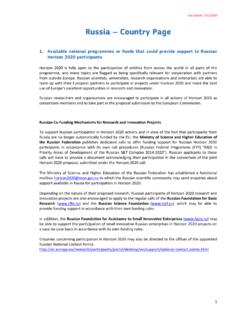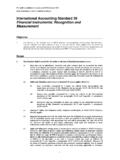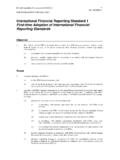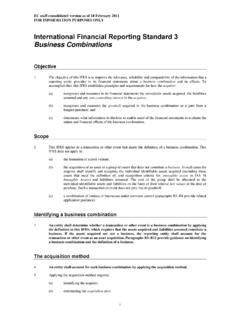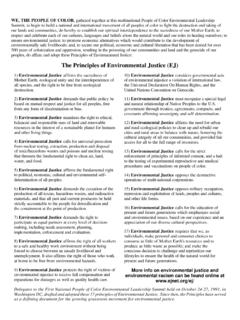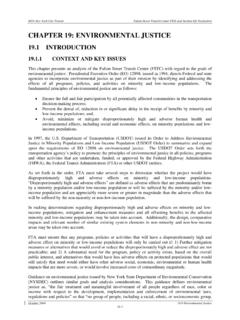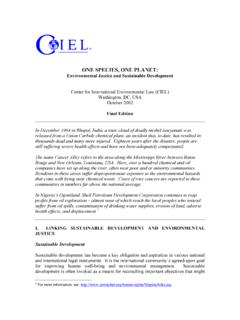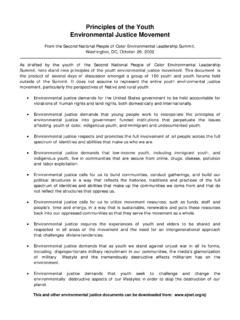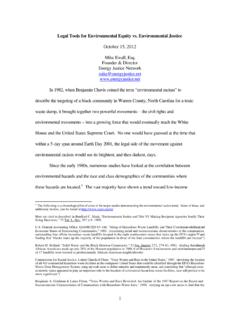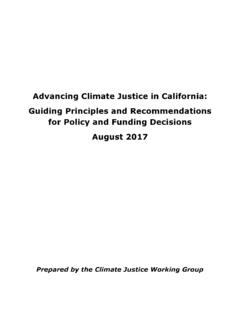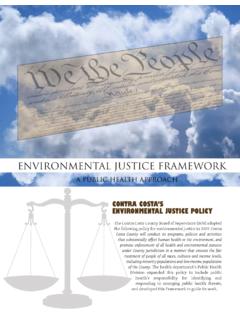Transcription of PRINCIPLES OF EU ENVIRONMENTAL LAW
1 COOPERATION WITH NATIONAL JUDGES AND PROSECUTORS IN THE FIELD OF EU ENVIRONMENTAL LAW EU ENVIRONMENTAL law and national Courts: the key role of the national judge WORKSHOP ON EU LEGISLATION PRINCIPLES OF EU ENVIRONMENTAL LAW European Commission, European Environment Agency 2 EU ENVIRONMENTAL law Pollution control of industrial installations Public Participation in ENVIRONMENTAL decisions Water quality, Waste water, Drinking water Protecting biodiversity Waste management GMOs Air quality PRINCIPLES OF EU ENVIRONMENTAL LAW Current legal basis for ENVIRONMENTAL policies Article 3(3) TEU defines the objectives of the EU: The Union shall work for sustainable development of Europe based on balanced economic growth and price stability (..) and a high level of protection and improvement of the quality of the environment Art. 191 TFEU : defines objectives and PRINCIPLES of EU ENVIRONMENTAL policy (+ new legal basis for climate change and sets a new legal basis for EU energy policy) Transboundary effects in third countries: international treaties/agreements PRINCIPLES OF EU ENVIRONMENTAL LAW ENVIRONMENTAL PRINCIPLES in the treaties Article 5 TEU defines general PRINCIPLES /mechanisms of EU law: Conferral Proportionality Subsidiarity Article 191(2) TFEU defines ENVIRONMENTAL PRINCIPLES : Union policy on the environment shall aim at high level of protection taking into account the diversity of situations in the various regions of the Union.
2 It shall be based on the precautionary principle and on the PRINCIPLES that preventive action should be taken, that ENVIRONMENTAL damage should as a priority be rectified at source and that the polluter should pay PRINCIPLES OF EU ENVIRONMENTAL LAW 5 Ensuring compliance with EU law: key actors Role of the Commission and related powers granted by the Treaty Article 17 EU and role of Guardian of the Treaties Specific powers of Articles 258 TFEU et 260 TFEU Role of national judges and role of the Court of justice of the European Union The possibility to ask questions to the European Court of the European Union: system of preliminary reference The concept of direct effect PRINCIPLES OF EU ENVIRONMENTAL LAW 6 Article 17 TUE 1 . The Commission shall promote the general interest of the Union and take appropriate initiatives to that end.
3 It shall ensure the application of the Treaties, and of measures adopted by the institutions pursuant to them. It shall oversee the application of Union law under the control of the Court of justice of the European Union.(..) 2. Union legislative acts may only be adopted on the basis of a Commission proposal, except where the Treaties provide otherwise. (..) The mission of the European Commission PRINCIPLES OF EU ENVIRONMENTAL LAW 7 Arts. 258, 259 & 260 TFEU. - Art 258 states: If the Commission considers that a Member State has failed to fulfil an obligation under the Treaties, it shall deliver a reasoned opinion on the matter after giving the State concerned the opportunity to submit its observations. If the State concerned does not comply with the opinion within the period laid down by the Commission, the latter may bring the matter before the Court of justice of the European Union.
4 Purpose: to enable the Court of justice to determine whether a MS has fulfilled its obligations under EU Law Bringing a case to the Court of justice : the infringement procedure PRINCIPLES OF EU ENVIRONMENTAL LAW 8 Bringing a case to the Court of justice : the infringement procedure Before bringing the case before the Court, the Commission conducts a preliminary investigation (pre-litigation phase) in which the MS concerned is given the opportunity to reply to the complaints addressed to it If this does not result in the MS terminating the failure, an action of infringement may be brought before the Court If the Court finds that an obligation has not been fulfilled, the MS must bring the failure to an end without delay In case of non-compliance with this first judgement, the Court may impose on the MS a fixed or periodic financial penalty PRINCIPLES OF EU ENVIRONMENTAL LAW 9 Lump Sum Art.
5 260 TFEU Penalty Payments 2005 Communication: seriousness , duration and deterrent minimum amounts multiplied by coefficients for seriousness, duration and ability to pay proportionality note: Court is not bound by Communication Case Commission v. France, C-304/02 Infringement and financial penalties: Art 260 TFEU PRINCIPLES OF EU ENVIRONMENTAL LAW 12 Two main components: Preliminary reference: possibility for the national judge to ask the ECJ about interpretation of a given provision of EU law Concept of direct effect : the national judge is bound to enforce the rights conferred to individuals by a provision of EU law The key role of the national judge PRINCIPLES OF EU ENVIRONMENTAL LAW 11 Why referring a question to the ECJ ? An interpretation problem related to EU law: how shall I as national judge interpret Article 4(2) of a given Directive?
6 A problem which is not hypothetical A problem which was not already solved The preliminary reference mechanism PRINCIPLES OF EU ENVIRONMENTAL LAW 12 The preliminary reference mechanism The text of Article 267 TFEU has not been much modified compared to old Article 234 EC This mechanism is in place since the beginning of the EU source of the EU law precedence and EU legal order: Case C-6/64, Costa/ENEL By the terms of this article, however, national courts against whose decisions, as in the present case, there is no judicial remedy, must refer the matter to the Court of justice so that a preliminary ruling may be given upon the interpretation of the treaty whenever a question of interpretation is raised before them. PRINCIPLES OF EU ENVIRONMENTAL LAW 13 The preliminary reference mechanism Member States Courts or Tribunals ECJ May refer (must do so if no appeal possible under national law) a question on the validity or interpretation of EU Law Preliminary ruling PRINCIPLES OF EU ENVIRONMENTAL LAW 14 Definition: direct effect means that when provisions of EU law confer rights to individuals, they make invoke them before national courts who are then bound to enforce those rights.
7 EU Treaties do not contain any general rule on the effect of the EU law provisions: Principle of direct effect introduced by Court of justice in landmark case of Van Gend en Loos Case C-26/62, Van Gend en Loos Cases C-41/74, Van Duyn and C-148/78, Ratti Direct effect of EU law makes national judges EU law judges The concept of direct effect PRINCIPLES OF EU ENVIRONMENTAL LAW 15 The concept of direct effect : Van Gend en Loos (C-26/62) Facts Appeal by individual before Dutch administrative tribunal against payment of a newly-increased import duty charged by the Netherlands contrary to Art. 12 of the EEC Treaty (now Art. 30 TFEU) Issue Could individuals rely on this before national courts? Judgement of ECJ Treaty more than an agreement which merely creates mutual obligations between contracting states Also confers rights on individuals, which arise not only where they are expressly granted by the Treaty, but also by reason of obligations which the Treaty imposes in a clearly defined way on individuals as well as on Member States and EU institutions Therefore, Art.
8 12 EEC Treaty interpreted as being directly effective, as this was a means of ensuring uniform application in all MS PRINCIPLES OF EU ENVIRONMENTAL LAW 16 Conditions for direct effect Problem: Some Treaty provisions drafted in general terms and Not all are designed to be applied directly by national courts Solution: ECJ established criteria for direct effect Essentially, the provision must be self-executing , : Intended to confer rights to individuals Sufficiently clear and precise Unconditional PRINCIPLES OF EU ENVIRONMENTAL LAW 17 The concept does not only deal with directives but with all areas of EU law (Treaties, Regulations, Directives, Decisions) Regulations and decisions: direct effect & direct applicability Main source of problems when applying direct effect: directives Conditions for direct effect of directives: Conditional on transposition and implementation (but standstill obligation for the MS) Directives can only have vertical direct effect, never horizontal Which legal acts can have direct effect?
9 PRINCIPLES OF EU ENVIRONMENTAL LAW 18 Notion of State has been interpreted very broadly: ..a body, whatever its legal from, which has been made responsible, pursuant to a measure adopted by the State, for providing a public service under the control of the State and has for that purpose special powers beyond those which result from the normal rules applicable in relations between (C-188/89, Foster v British Gas) Importance of the binding effect of directives (Art. 288): Case C-72/95, Kraaijeveld, regarding direct effect of provisions of the EIA directive Judges must read national law in conformity with EU law and even discard national law when necessary (Case C-106/89, Marleasing SA; Case C-148/78, Ratti) Broad interpretation of the notion of direct effect PRINCIPLES OF EU ENVIRONMENTAL LAW 19 Conclusion: Two complementary alternatives for ensuring compliance with EU law EU law implementation problem Judgement on failure to fulfil obligations Referral to a national Court National judge Commission is informed or Commission identifies the problem Commission Article 267 TFEU Article 258 TFEU Court of justice of the European Union Judgement on preliminary reference Ruling of national Court PRINCIPLES OF EU ENVIRONMENTAL LAW
